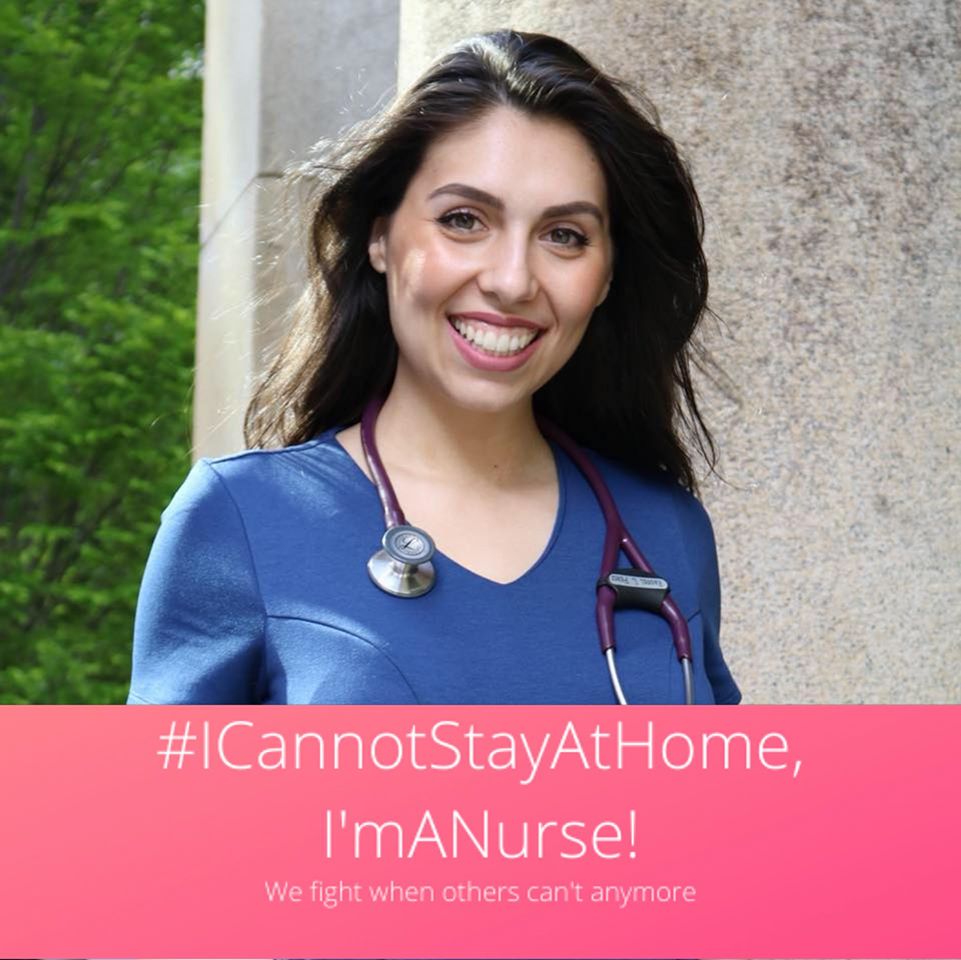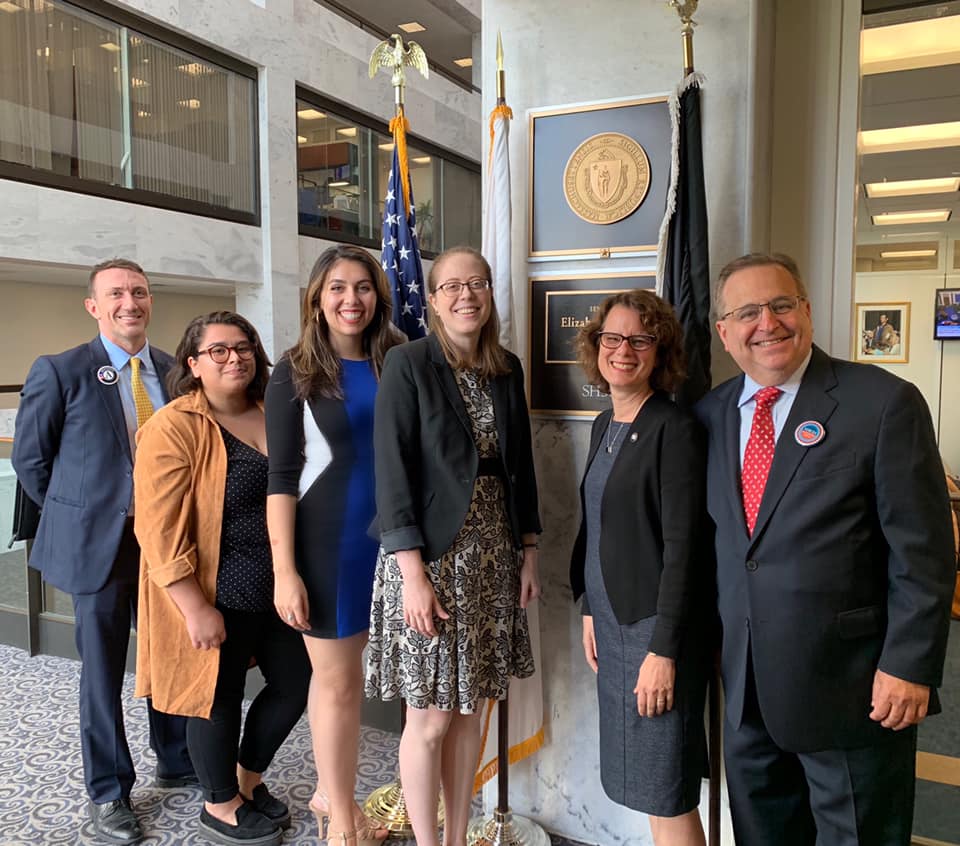Interview with Segal Fellow Raquél Lynn Pérez
Below is an interview with Raquél Lynn Pérez, who is currently taking the citizen leadership curriculum as a 2019 AmeriCorps Alums Segal Fellow. Raquél is also a Registered Nurse at the Women and Infants Hospital of Rhode Island. She took time to discuss her experiences as a frontline worker, and as a citizen leader in these times, with Segal Program Coordinator Kyle Richard.

KR: Raquél, you are a registered nurse and a frontline worker working through this crisis. For those who might not know the full breadth of what a registered nurse might do at this time, could you explain more about what the day in the life of a nurse working in the COVID crisis would be?
Raquél Lynn Pérez: So I am an oncology registered nurse, which means that I work with patients who have cancer, specifically, women with cancer. They may just be coming out of surgery to prevent it, or coming out of a chemotherapy treatment. Normally before the pandemic, I would make sure that post operation, my patients are okay, that the surgery did not force their bodies into a complete downhill spiral, that they're managing well, and that their pain is OK. I would make sure any questions they have are answered.
Beyond having patients come out of surgery, we will have patients who are end of life and are on hospice care, which means transition from actively fighting the battle of their disease to being comfortable into the end of their life, so that also is an aspect of my job that I have to take on, which is an emotional aspect of my job
KR: How has work changed since the beginning of the COVID-19 Pandemic?
Raquél Lynn Pérez: With the pandemic, obviously I've thought very much about my patients who are highly immunocompromised because they have cancer, because they're out of surgery and because they are potentially actively dying. Now, every healthcare worker is screened. We have to have our temperatures taken, and we are asked a series of questions of symptoms and if we are experiencing them, yes or no? If you're experiencing any one of them, then you have to go home. No questions asked.
We are also required to wear a surgical or cloth mask for the full 12 hour shifts that I'm there. The floor that I work in, specifically, has been the designated the COVID floor. I was required to wear the full gear that you've been seeing on TV is social media: Face shield, N95s, double gloved and a gown.
When you asked what has changed, it's really been the policy of it all, because something that I really just want to make sure that the general public recognizes is that we have been here this whole time. The policies have been more stringent, but they haven't changed. So this is not something that's new. The urgency of the virus is unknown and new, the need for PPE at a rapid rate, that's new, and the general public's knowledge is new, but we've always been prepared. We've always been the last person to hold a patient's hand when they're passing away. We've always been their adoptive family members when they haven't had any. We've always been taking care to the highest level of degree that we possibly can. And we will continue to do that well after this virus is dealt with. The policies have changed in terms of what we are now required to do to keep us safe and to keep the patient safe, and for them to keep us safe as well. They also have to wear masks now. But the tasks, the responsibilities, the care that is always been and will remain the same.

KR: You have been interspersing your work in this very serious and troubling time with the Segal Fellow curriculum with us, that makes you think more about leadership, social justice, cultural competency, etc. What has it been like doing the curriculum concurrently with the crisis, and has it changed your thinking about your current role? Has it modified your mindset or even been a place to vent?
Raquél Lynn Pérez: Well, one, I would say that it absolutely has been a wonderful outlet, because I think about the pandemic from the moment I wake up to the second that I fall asleep. Mostly because it's all over. It's on the news, on social media, but then I go and I work in it. Having the moment to tap into the parts of myself that I felt were there before everything went on, before the chaos happened, has been immensely helpful, especially because I'm very passionate about advocacy, policies and making sure that people are fairly treated, that we're getting what we need and that there's equal social justice. So talking in these cohort sessions every month about what we value and being citizen leaders... Yes, it's absolutely helped me identify that part of me when I'm at work.
I think about “Okay, what is the bigger picture here? What am I saying that's wrong, and what can be fixed?” I don't know that everybody always has that mindset, because they don't necessarily want to or need to. And that's perfectly and absolutely fine, but for me, I know I'm part of this fellowship, I think, for a very specific reason. And that's because I am somebody who was a citizen leader or started to develop that before. Coming into the here and now, I've sharpened those skills. So it's a constant thing, and especially now that COVID has hit, I've often found myself thinking, “Okay, what is my role here, what do I want to do?” I've always had a passion or the feeling in my heart that I want to go after something bigger. I do want to be behind the scenes and working on the systematic parts of what it means to be a healthcare worker so that we can have equal rights. We're seeing that now with the PPE shortage. We were ill prepared, and I don't know that you can really prepare for a pandemic that well, but we could have done a much better job.
So on my time off, I've been doing small things to make sure that I'm setting myself up for that, whether that is supporting local businesses and orgs that I think need help. Just in a small donation or by partnering with people and making sure our voices are heard. I think I'm kind of annoying on social media at this point, because every day I'm sharing stuff to make people recognize what is reality and what is not.
KR: That's great! The last thing I want to ask you is if there were someone who might be struggling with the idea of being positive, or feeling like they're not being active enough, especially if they're not frontline workers, what would you tell someone who is struggling to feel that motivation to be positive or feel like they're stuck in this time?
Raquél Lynn Pérez: I would say it's okay not to be okay. It's something that I have struggled with constantly during this time. The thing is, I am somebody who emotes constantly and I feel the weight of the world, almost too much. So this has been a unique situation for myself, because I work in it, but for everybody else I totally get it. I understand if there's no way to really feel positive because it's just such a unique thing and everybody is shifting. We don't know what people's home lives are like, if they're safe, if they have means for rent, if they're financially stable... there [are] a lot of different factors, but how I've managed through this is by taking it day by day in small chunks.
Something that's been very, very helpful: the first thing I do when I wake up (when I can) is write down things I'm grateful for. This really puts me in a mindset of positivity, and then if throughout the day there's something that annoys me, frustrates me, stresses me out and I'm in a negative mind frame, again I go back to what I wrote. It's a very small thing, like I'll write down even things like "I'm happy that I had my warm blanket on my bed today," like the smallest things, because all of that adds up. It doesn't have to be a huge monumental thing, but that has really elevated my spirits. I've been listening to audiobooks, and in one of them the recommendations for bringing in positivity and gratitude was writing all of that down.
So like I said, it's okay not to be okay. But looking at things in the smallest form like this, I am at least happy that I have this, even if it's just like "I woke up today," that has really helped me... made it manageable to get through today.
KR: Thank you Raquél.
Raquél Lynn Pérez: My pleasure!
